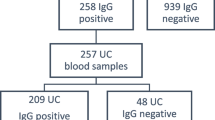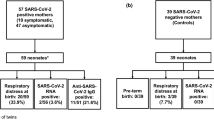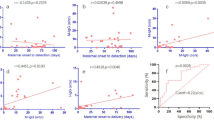Abstract
Background
Maternal vaccination for Influenza and Tetanus, Diphtheria, acellular Pertussis (TDaP) have been well studied in terms of safety and efficacy for protection of the newborn by placental passage of antibodies. Similar newborn protection would be expected after maternal vaccination against severe acute respiratory syndrome coronavirus 2 (SARS-CoV-2), the virus responsible for coronavirus disease 2019 (COVID-19). There is a significant and urgent need for research regarding safety and efficacy of vaccination against SARS-CoV-2 during pregnancy.
Case presentation
A vigorous, healthy, full-term female was born to a COVID-19 naïve mother who had received a single dose of messenger RNA (mRNA) vaccine for SARS-CoV-2 3 weeks prior to delivery. IgG cord blood antibodies were detected to SARS-CoV-2 at the time of birth.
Conclusion
Here, we report the first known case of an infant with SARS-CoV-2 IgG antibodies detectable in cord blood after maternal vaccination.
Similar content being viewed by others
Background
Vaccination for Influenza and TDaP (tetanus, diphtheria, acellular pertussis) have been well studied in terms of safety and efficacy for protection of the newborn by placental passage of antibodies. Similar newborn protection would be expected after maternal vaccination against SARS-CoV-2 (the virus responsible for COVID-19). There is a significant and urgent need for research regarding safety and efficacy of vaccination against SARS-CoV-2 during pregnancy. Here, we report the first known case of an infant with SARS-CoV-2 IgG (immunoglobulin type G) antibodies detectable in cord blood after maternal vaccination.
Case presentation
Maternal vaccination was provided to a COVID-19-naïve by history front-line healthcare worker with the Moderna mRNA COVID-19 vaccine, at gestational age of 36 weeks 3 days. Per birth hospital protocol the mother was also tested for COVID-19 via polymerase chain reaction (PCR) testing at time of admission to the labor and delivery ward which was negative. A normal, spontaneous vaginal birth occurred 3 weeks after dose 1 of the Moderna vaccine. The product of this 39 week 3 days gestation was a vigorous, healthy, full-term girl with normal newborn nursery course and subsequent well-infant evaluation. Under aseptic conditions and along with standard cord blood sampling for newborn blood type and direct antiglobulin test (DAT) a cord blood sample was taken immediately after birth and prior to placenta delivery with 0.5 mL drawn into a red-top tube for serum. The serum was sent for SARS-CoV-2 antibody test to the S-protein as performed by Labcorp. The mother, who has been breastfeeding exclusively, then received the second dose of the Moderna vaccine during the post-partum period per the normal 28-day vaccination protocol timeline. Cord blood antibodies (IgG) were detected to SARS-CoV-2 at a level of 1.31 U/mL. This Electrochemiluminescence Immunoassay (ECLIA) uses a recombinant protein representing the RBD (receptor-binding domain) of the S antigen for the quantitative determination of antibodies against SARS-CoV- 2 [1].
Discussion and conclusion
Vaccination during pregnancy with TDaP and Flu is both well studied and formally recommended [2,3,4,5]. The COVID-19 Pandemic and subsequent EUAs (Emergency Use Authorization) for two mRNA vaccines have created significant need for active research regarding safety and efficacy in pregnant and lactating mothers, as well as their offspring [6, 7].
The novel mRNA vaccines theoretically will demonstrate similar safety in this population, including placental passage of protective antibodies. Natural SARS-CoV-2 infection, however, seems to confer lower than expected passage of antibodies to the fetus which may indicate newborns born to vaccinated mothers will remain at risk for infection [8].
We have demonstrated that SARS-CoV-2 IgG antibodies are detectable in a newborn’s cord blood sample after only a single dose of the Moderna COVID-19 vaccine. Thus, there is potential for protection and infection risk reduction from SARS-CoV-2 with maternal vaccination. Quantification of the antibody response can help to determine the specific antibody titer and aid in longitudinal monitoring of the dynamics of the antibody response in individual patients. Protective efficacy in newborns and ideal timing of maternal vaccination remains unknown. Further studies will be needed to quantify the amount of viral neutralizing antibodies present in babies born to SARS-CoV-2 naïve mothers who are vaccinated prior to delivery. Additionally, the duration of antibody protection in this population is not yet known and serial total antibody measurements may be used to determine how long protection is expected which may help to determine when the best time would be to begin vaccination in newborns born to mothers who received a vaccine for SARS-CoV-2.
We urge other investigators to create pregnancy and breastfeeding registries as well as conduct efficacy and safety studies of the COVID-19 vaccines in pregnant and breastfeeding woman and their offspring. Here, we report the first known case of an infant with SARS-CoV-2 IgG antibodies detectable in cord blood after maternal vaccination.
Availability of data and materials
Not applicable.
Abbreviations
- TDaP:
-
Tetanus, Diphtheria, acellular Pertussis
- IgG:
-
Immunoglobulin type G
- ECLIA:
-
Electrochemiluminescence Immunoassay
- EUA:
-
Emergency use authorization
References
Woo PC, Lau SK, Wong BH, et al. Differential sensitivities of severe acute respiratory syndrome (SARS) coronavirus spike polypeptide enzyme-linked Immunosorbent assay (ELISA) and SARS coronavirus Nucleocapsid protein ELISA for Serodiagnosis of SARS coronavirus pneumonia. J Clin Microbiol. 2005;43(7):3054–8.
Hardy-Fairbanks AJ, et al. Immune responses in infants whose mother received tdap vaccine during pregnancy. Pediatr Infect Dis J. 2013;32(11):1257–60.
Walls T, et al. Infant outcomes after exposure to Tdap vaccine in pregnancy: an observation study. BMJ Open. 2016;6:e009536.
Baxter R, et al. Effectiveness of vaccination during pregnancy to prevent infant pertussis. Pediatrics. 2017;139(5):e20164091.
Black SB, et al. Effectiveness of influenza vaccine during pregnancy in preventing hospitalizations and outpatient visits for respiratory illness and in pregnant women and their infants. Am J Perinatol. 2004;21(6):p333–9.
Oliver S, Gargano J, Marin M, et al. The advisory committee on immunization practices’ interim recommendation for use of Moderna COVID-19 vaccine — United States, December 2020. MMWR Morb Mortal Wkly Rep. 2021;69:1653–6.
The American College of Obstetricians and Gynecologists. Vaccinating Pregnant and Lactating Patients Against COVID-19. Acog.orgPractice Advisory. https://www.acog.org/clinical/clinical-guidance/practice-advisory/articles/2020/12/vaccinating-pregnant-and-lactating-patients-against-covid-19
Edlow AG, Li JZ, Collier AY, et al. Assessment of maternal and neonatal SARS-CoV-2 viral load, Transplacental antibody transfer, and placental pathology in pregnancies during the COVID-19 pandemic. JAMA Netw Open. 2020;3(12):e2030455.
Acknowledgements
None.
Financial disclosure
The authors have no financial relationships relevant to this article to disclose.
Funding
No external funding for this manuscript.
Author information
Authors and Affiliations
Contributions
PG examined subject, co-wrote manuscript and reviewed final draft. CR examined subject, co-wrote manuscript and reviewed final draft. All authors have read and approved the manuscript.
Corresponding author
Ethics declarations
Ethics approval and consent to participate
Exempt.
Consent for publication
Obtained by all parties involved. Mother of newborn subject provided written consent.
Competing interests
The authors have competing interests to disclose.
Additional information
Publisher’s Note
Springer Nature remains neutral with regard to jurisdictional claims in published maps and institutional affiliations.
Rights and permissions
Open Access This article is licensed under a Creative Commons Attribution 4.0 International License, which permits use, sharing, adaptation, distribution and reproduction in any medium or format, as long as you give appropriate credit to the original author(s) and the source, provide a link to the Creative Commons licence, and indicate if changes were made. The images or other third party material in this article are included in the article's Creative Commons licence, unless indicated otherwise in a credit line to the material. If material is not included in the article's Creative Commons licence and your intended use is not permitted by statutory regulation or exceeds the permitted use, you will need to obtain permission directly from the copyright holder. To view a copy of this licence, visit http://creativecommons.org/licenses/by/4.0/. The Creative Commons Public Domain Dedication waiver (http://creativecommons.org/publicdomain/zero/1.0/) applies to the data made available in this article, unless otherwise stated in a credit line to the data.
About this article
Cite this article
Paul, G., Chad, R. Newborn antibodies to SARS-CoV-2 detected in cord blood after maternal vaccination – a case report. BMC Pediatr 21, 138 (2021). https://doi.org/10.1186/s12887-021-02618-y
Received:
Accepted:
Published:
DOI: https://doi.org/10.1186/s12887-021-02618-y




